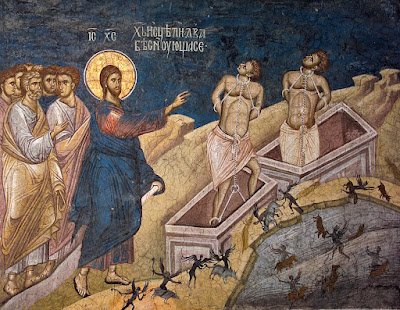First, we see that demons have the ability to possess men, making their victims worse than dead men. For at least the dead have their souls in the hands of God, while those possessed by demons have their souls and bodies enslaved by the demons. The healing of these possessed men is actually much greater than the miracles of Christ raising the dead.
We also learn that the demons are very strong and dangerous and desire the physical and spiritual death of all mankind. We learn from the parallel accounts in Mark and Luke that these demons caused the possessed men to cut themselves with rocks and caused them to strip themselves of clothing and dwell in the cemetery. They were able to beak the chains that were put on them by those that tried to restrain them and they forced those that lived nearby to avoid them out of fear for their lives.
They chose to live in the cemetery to trick the people into believing that the souls of the dead became demons, causing great confusion and leading people into sorcery.
By their action of destroying the multitude of swine, we see that they would quickly destroy all of mankind if they were given the ability to do so by God. We also see that even when they were cast out of these men, they desired to bring further misfortune to men by destroying the costly multitude of swine, with the desire that the pig herders curse God for this great financial loss.
Next, we learn about the great judgment and the torments of Hell. The demons immediately felt the torment that awaits them when our Lord confronted them, like the bright sun to weak eyes. They knew that they had a little while to continue in their filth and were grieved when it seemed that maybe the time had come for them to be cast into hell and to be deprived of tormenting man any longer. They, like many men confronted with death, out of torment and despair, tried to appeal to our Lord’s mercy by calling on Him as the Son of God.
We should learn from the demons who are aware of the torment to come, that this torment also awaits sinful men in no less measure. Unlike the demons, we have the choice to turn from our wicked ways and to be spared the torment prepared for the demons.
Lastly, we can speak about the spiritual lessons that apply to each of us. By God allowing the demons to enter into the swine, we learn that the demons desire to enter into those that are swine-like in their uncleanness and glutenous behavior. Our Lord wants to teach us how quickly we go to destruction, like the herd of swine, when we do not practice patience and fasting and do not strive to lead a pure life.
These demoniacs spiritually represent men addicted to all kinds of vices. Like the demoniacs that went about naked, these men, although clothed in garments, are deprived of the true covering, the glory of the image of God. And as they cut themselves with stones, these sinful men cut themselves with their sins. And as they haunted the tombs, these men cannot break free from frequenting places of sin which are more full of death than any cemetery.
And as they were able to break free from all types of restraints, these sinful men also do not listen to threats or counsel that would restrain their wickedness and free them from their sin.
And we also are very much like the city that saw the great works of our Lord and asked that He depart from us. We are given so many miracles and promises of spiritual healing in the Church and yet we still would rather enjoy the pleasures of this fallen world than take the narrow path to salvation that requires of us a stricter way of life. We would prefer the multitude of swine over being in our right mind.
It is not possible for us to be cured of these sicknesses on our own. So let us beg our Lord to give us the strength to turn from our passions and to follow after Christ, and like the freed demoniac, share with all the great things that our Lord has done for us, to Whom be the glory together with the Father and the Holy Spirit now and ever and unto the ages of ages, Amen.








